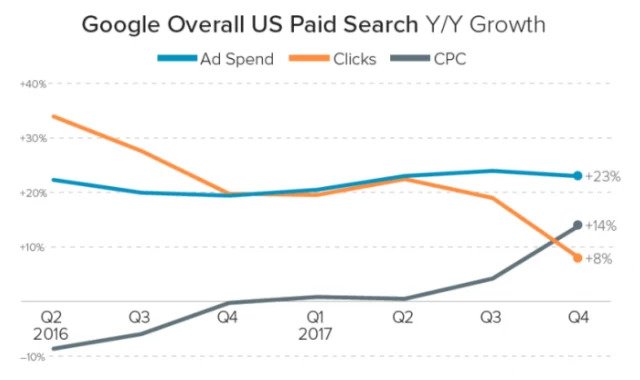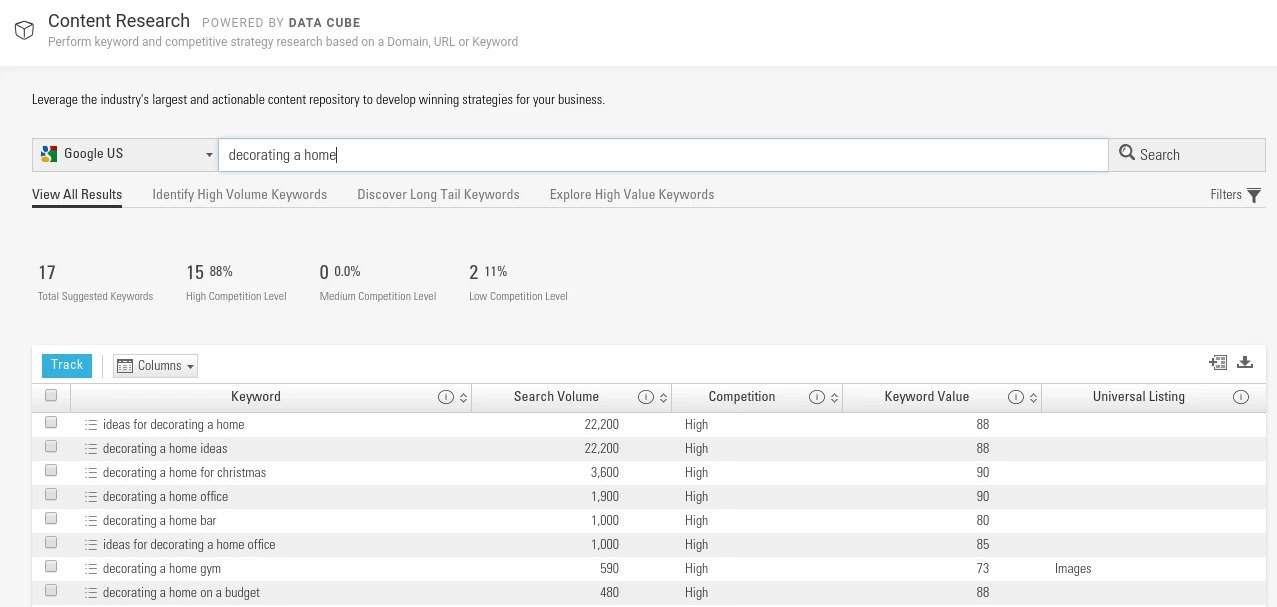With over 3.5 billion searches made per day, ranking well on the SERP has tremendous power to drive traffic towards your site.

BrightEdge Research tracks channel share and finds that SEO traffic is still the largest trackable channel and in the majority at 53% of traffic, which is a number people across the community use to help elevate SEO to the C-suite to secure more support and resources.
48% of queries, however, also have paid ads that appear above the organic site results, so brands that neglect to integrate their organic and paid search strategies will lose out on tremendous potential for attracting the attention of prospects.
As brands compete for attention on the SERP, it has become increasingly common for organizations to invest in PPC. There was a 24% growth year over year in ad spend in 2017. Brands who don't carefully develop integrated campaigns run the risk of being left far behind.
Five ways you can integrate organic and paid search to drive greater success online:
- Use paid search to test organic keywords
- Use organic keyword research to find good paid keywords to target
- Use paid to raise traffic and attention for seasonal or new content
- Use paid search to target hard-to-reach keywords
- Use organic content to build stronger paid campaigns
- Use paid and search together to maximize your presence on the SERP
Use paid search to test organic keywords
Raising your rankings with organic keywords requires considerable effort. You need to not only develop content but also promote the content across various channels and platforms to raise its visibility.
Strong SEO also requires meeting various optimization goals and using technical efforts to improve its visibility on the search engines.
Before you invest your time and energy in this process, many brands find it helpful to first research and see if the keywords will bring in the desired return. You can leverage Instant to deep dive into relevant keywords you should optimize for. PPC can be an excellent asset for this research.
Develop a bit of content and set up paid search campaigns to test the receptiveness of the target audience. Since paid ads will have a prominent display on the SERP when they appear, you can be confident that your site will be visible for the target keyword. You can then gauge the interest of the audience based on how they respond to the ad.
If you get a lot of clicks, for example, but also a high bounce rate and a low conversion rate from your effort, then you have a reasonable idea that your site and content might not align well with the user intent for this keyword.
On the other hand, if you see an outstanding response to your site and content, then you can feel confident throwing your resources behind an organic search campaign centered around this theme. This will help you better invest your resources moving forward.
Use organic keyword research to find good paid keywords to target
You can use your organic keyword research to find good paid keywords to build your campaigns. Using platform features like Data Cube can provide greater insight than just for your organic search campaigns. You can also use them to create PPC strategies. 
Use Data Cube to find relevant keywords and base you interest around the search volume. You can also research the keyword further to see what types of content appears on the page for that particular term, as well as how many ads appear at the top of the page. This will help you create a list of keywords that will provide the most value for your brand.
Use paid to raise traffic and attention for seasonal or new content
Many brands need to produce seasonal or new content for various new products or seasonal events. Producing content and then earning rankings on the search engine high enough to capture a significant portion of the relevant traffic within a very short period, however, can be very difficult. The task can feel nearly impossible for smaller brands who do not have sites carrying an immense amount of domain authority.
PPC can help fill in this gap. You can use paid search strategies to raise the prominence of your site for high-value keywords. This will help you attract traffic and engagement to the page earlier than you would have relying solely on organic.
Since a well-qualified paid search campaign also brings in relevant traffic, your efforts can also help to further boost the organic rankings of the material.
Use paid search to target hard-to-reach keywords
There are more than a billion websites online. This means that nearly every industry has intense competition online. This competition renders some keywords particularly difficult to rank highly for. You likely have encountered some keywords that are highly relevant for your target audience, but the sites that rank well for these terms are well established. Finding ways to surpass these keywords in organic will be nearly impossible.
Paid search, however, can help to achieve this goal. Between one and four ads will be shown at the top of the SERP for most queries. This means that PPC will increase your visibility on the SERP for those hard-to-reach keywords.
You will be able to gain the clicks and traffic that would likely have not been possible without a solid paid strategy.
Use organic content to build stronger paid campaigns
Building a strategy in paid search requires a greater upfront investment than organic campaigns. You have to pay for the clicks you receive on each ad. Therefore, as you build your strategy, you want to make sure you invest your money wisely. Use organic search and content strategies to build outstanding content that will drive your paid search campaign.
Just like any other type of click, when a potential customer clicks on an ad, they want the content on that page to answer their need. Brands already know about the importance of building high-quality content to meet the needs of their organic campaigns, but those same strategies also need to apply to the paid campaigns.
Create material that addresses the likely pain point of someone making that particular search. Use the keywords regularly in the content so that the site visitor knows immediately that the content has relevance for them. Use images, lists, bullets, and subheadings to make the content look appealing and interesting.
Use organic and paid search together to maximize your presence on the SERP
The key to both paid and organic search lies in visibility on the SERP. When you use them together, you can maximize your visibility and presence.
- Align the language you use across your organic and paid search strategy. Keep the messaging consistent so that users recognize you between channels.
- Leverage the two together to drive traffic towards content. Even if you achieve page one ranking for a particular valuable keyword, a paid ad on that keyword can still boost visibility, particularly since most clicks go towards the links at the top of the SERP.
- Use PPC to drive content engagement on other channels. PPC does not only live on the search engines. It also can help on the different social platforms, driving clicks towards your content through social channels.
- Use the two together to capitalize on user intent. Google has focused over the past few years on deciphering the user intent of people making searches. This explains why the SERP can vary widely from search to search with the number of ads, visual content, and articles that appear. As you create your organic and PPC campaigns, consider carefully the intent of of users for those keywords and create all your material to align with these needs. You can leverage Market Insights to better understand data intent and insights into market trends.
Paid and organic search are two important tools for any marketer looking to increase their presence on the SERP. Understanding how these two interact will allow you to integrate these two strategies and build stronger campaigns, driving greater traffic towards your website.

